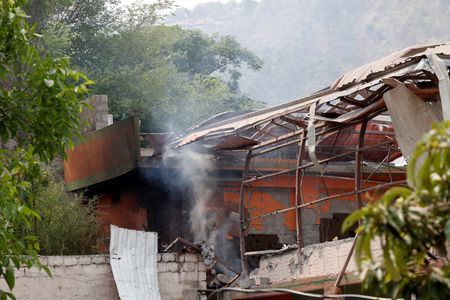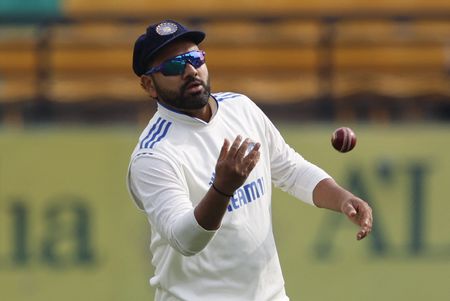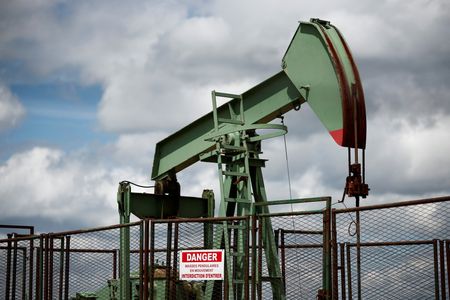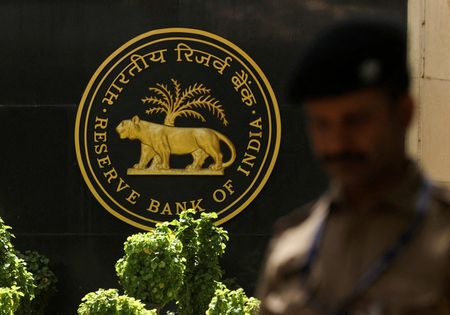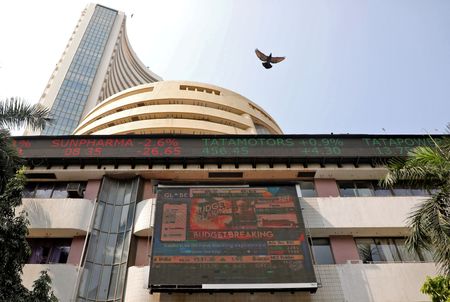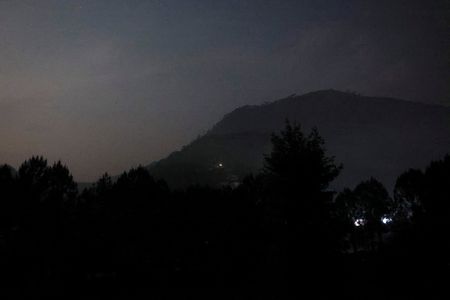By Asif Shahzad and Shivam Patel
MUZAFFARABAD, Pakistan/NEW DELHI (Reuters) -India hit Pakistan and Pakistani Kashmir with missiles on Wednesday and Pakistan said it had shot down five Indian aircraft and vowed to retaliate, in the worst fighting in more than two decades between the nuclear-armed neighbours.
India said it struck nine “terrorist infrastructure” sites, some of them linked to an attack by Islamist militants on Hindu tourists that killed 26 people in Indian Kashmir last month.
Pakistan said at least 26 people had been killed on Wednesday and that India “had ignited an inferno in the region”. Islamabad pledged to respond “at a time, place and manner of its choosing to avenge the loss of innocent Pakistani lives and blatant violation of its sovereignty”.
A government security committee said Islamabad emphatically rejected Indian allegations of the presence of terrorist camps on its territory.
The Indian strikes included targets in Punjab, its first attacks on Pakistan’s most populous province since the last full-scale war between the old enemies more than half a century ago, triggering fears of further hostilities in one of the world’s most dangerous flashpoints.
“The targets we had set were destroyed with exactness according to a well-planned strategy,” India’s Defence Minister Rajnath Singh said. “We have shown sensitivity by ensuring that no civilian population was affected in the slightest.”
Islamabad said none of the six locations targeted in Pakistan were militant camps. At least 26 civilians were killed and 46 wounded, a Pakistan military spokesperson said.
Indian TV channels showed videos of explosions, fire, large plumes of smoke in the night sky and people fleeing in several places in Pakistan and Pakistani Kashmir. Reuters could not independently verify the footage.
In Muzaffarabad, the capital of Pakistani Kashmir, damage from an Indian strike was visible at sunrise. Security forces surrounded a small mosque in a hill-side residential neighbourhood that had been hit, with its minaret collapsed. Later in the day, funerals were held for several of those killed.
Hindu-majority India and Islamic Pakistan have fought two of their three wars since independence in 1947 over Muslim-majority Kashmir, which both sides claim in full and control in part.
‘OPERATION SINDOOR’
A statement from the Pakistan prime minister’s office said five Indian fighter jets and drones had been shot down, although this was not confirmed by India. The Indian embassy in Beijing called reports of fighter jets downed by Pakistan “disinformation”.
Local government sources in Indian Kashmir told Reuters that three fighter jets had crashed in separate areas of the Himalayan region during the night and their pilots had been hospitalised. Indian defence ministry officials were not immediately available to confirm the report.
Images circulating on local media showed a large, damaged cylindrical chunk of silver-coloured metal lying in a field at one of the crash sites. Reuters could not immediately verify the authenticity of the image.
Indian forces attacked facilities linked to Islamist militant groups Jaish-e-Mohammed and Lashkar-e-Taiba, two Indian military spokespeople told a briefing in New Delhi, in what New Delhi called “Operation Sindoor”.
Sindoor is the Hindi language word for vermilion, a red powder that Hindu women put on the forehead or parting of their hair as a sign of marriage.
India had earlier said two of three suspects in the tourist attack were Pakistani nationals, without detailing any evidence. Pakistan has denied any links to the attack and called for an independent investigation.
The strikes used precision weapons to target “terrorist camps” that served as recruitment centres, launchpads and indoctrination centres and housed weapons and training facilities, the military spokespeople said.
Indian Foreign Secretary Vikram Misri, the top official in its external affairs ministry, told the briefing that the strikes were to pre-empt further attacks on India.
The neighbours also exchanged intense shelling and heavy gunfire across the “line of control”, their de facto border in Kashmir, police and witnesses told Reuters.
The shelling killed 15 civilians and wounded 43 in the Indian part of the region, police there said. At least six people were killed on the Pakistani side, officials there said.
RISK OF ESCALATION
The scale of the strikes went far beyond New Delhi’s response to previous attacks in Kashmir it has blamed on Pakistan, including in 2019 and 2016, which some analysts said meant the risk of escalation was higher.
“Given the scale of the Indian strike, which was far greater than what we saw in 2019, we can expect a sizable Pakistani response,” said Michael Kugelman, a Washington-based South Asia analyst and writer for the Foreign Policy magazine.
U.S. President Donald Trump called the fighting “a shame” and added, “I hope it ends quickly.” The State Department said Secretary of State Marco Rubio spoke to the national security advisers of both nations, urging “both to keep lines of communication open and avoid escalation”.
U.N. Secretary-General Antonio Guterres called for maximum military restraint from both countries, a spokesperson said. China, which neighbours both India and Pakistan, and Russia also called for restraint, as did Britain, which agreed a free trade deal with India on Tuesday.
On the ground in both countries, many people voiced anger and hostility towards the other.
“Pakistan has been testing our patience. The good thing is India is taking revenge,” said Kumar Ravi Shankar, a Delhi lawyer.
In Pakistan, businessman Umbreen Mahar said: “No one in today’s world wants to favour war. But if India continues to slander us and then attack, Pakistan has the right to retaliate and defend its sovereignty.”
AIRLINES CANCEL FLIGHTS
The escalation comes at a fragile moment for Pakistan’s $350 billion economy, which has recently emerged from a crisis with the government trying to shore up finances and make progress on the $7 billion International Monetary Fund loan programme agreed in 2024.
Pakistan’s international bonds rose on Wednesday, reversing early losses, while the benchmark share index fell 2.2%, after opening nearly 6% lower.
India’s stock market benchmarks closed little changed, while the Indian rupee closed nearly 0.5% lower at 84.8250 against the U.S. dollar, marking its worst performance since April 9.
Several airlines including India’s largest, IndiGo, Air India and Qatar Airways cancelled flights in areas of India and Pakistan due to closures of airports and airspace.
(Reporting by Asif Shahzad, Gibran Peshimam, Saeed Shah, Ariba Shahid in Pakistan, Shivam Patel, Tanvi Mehta, Krishna Das in New Delhi, Fayaz Bukhari in Srinagar, Tariq Maqbool in Muzaffarabad, Kanishka Singh, David Brunnstrom and Steve Holland in Washington; Writing by YP Rajesh, Raju Gopalakrishnan and Alex Richardson; Editing by Lincoln Feast and Philippa Fletcher)

